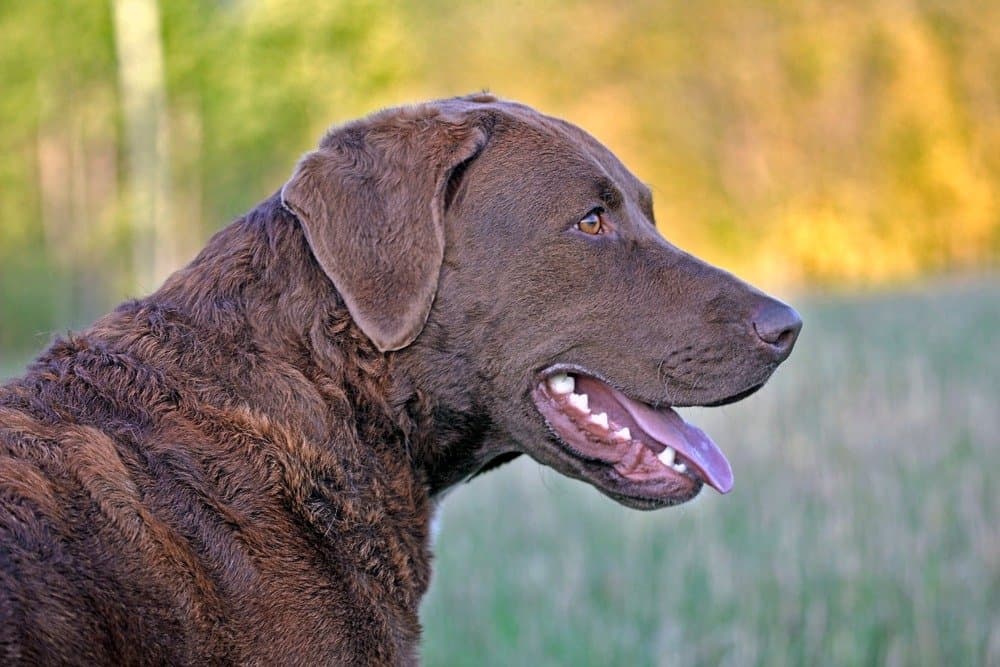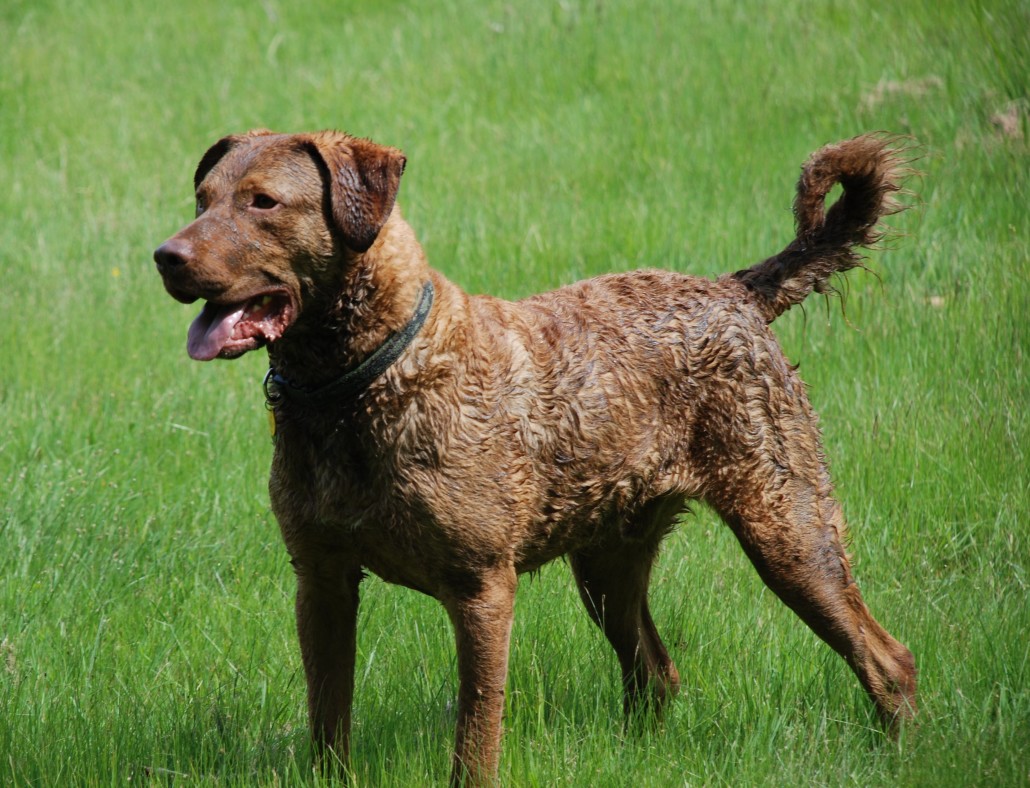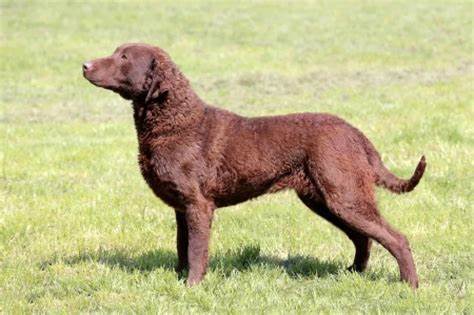
The Chesapeake Bay Retriever, affectionately known as the "Chessie," is a uniquely American breed developed in the early 19th century along the Chesapeake Bay in Maryland and Virginia. This powerful retriever evolved from two Newfoundland-type dogs rescued from a shipwreck in 1807, who were then bred with local retrievers and hounds to create a dog ideally suited for retrieving waterfowl in icy, turbulent waters.
The Chessie quickly earned a reputation as a tireless working dog, capable of retrieving dozens or even hundreds of birds in a single day, regardless of weather or water conditions. The breed was one of the first recognized by the American Kennel Club (AKC) in 1878, and it remains the official dog of the state of Maryland.
While not as widely known as the Labrador or Golden Retriever, the Chesapeake Bay Retriever has a devoted following among hunters, outdoorsmen, and active families. Its combination of loyalty, athleticism, and protective nature makes it stand out as a more rugged, independent alternative to its retriever cousins.
The Chessie is a powerful, medium-to-large dog built for strength, endurance, and water work.
• Coat: Thick, dense, and slightly oily, with a harsh outer layer and a wooly undercoat to repel water and insulate.
• Colors:
o Brown, sedge (reddish), or deadgrass (wheaten to straw-colored).
o Solid coloring is preferred, though small white spots on chest or toes are acceptable.
• Size:
o Height: 21–26 inches (53–66 cm).
o Weight: 55–80 lbs (25–36 kg).
• Head & Expression: Broad skull with a strong, tapered muzzle and intelligent, clear eyes.
• Ears: Small, drop ears set high.
• Tail: Medium-long, thick at the base, and used as a rudder in water.
• Body: Muscular and well-balanced, built for swimming and retrieving in cold, rough conditions.
The Chessie is intelligent, loyal, and hardworking, with a temperament that’s more reserved and protective than other retrievers.
• Extremely Loyal: Bonds closely with family and is protective without being aggressive.
• Independent Thinker: Less eager-to-please than Labradors—values logic and problem-solving.
• Hardworking and Driven: Thrives when given a task or job, especially retrieving or scent work.
• Calm Indoors, Energetic Outdoors: Well-mannered in the home but athletic and powerful during work or play.
• Wary of Strangers: Makes a good watchdog, though not typically reactive or anxious.

If you're looking for a rugged, loyal, and capable companion, the Chessie offers unmatched endurance and devotion.
• Ideal for Hunters and Outdoorsy Families: Excels in waterfowl retrieval, hiking, and active sports.
• Protective but Gentle: Provides natural security without the need for aggression.
• Unique Personality: More stoic and serious than other retrievers—suited for experienced owners.
• Weather-Resistant Coat: Handles cold water, snow, and rain with ease.
• Trainable and Intelligent: Learns quickly but needs structured, consistent training.
While the Chessie is hardy and adaptable, it requires mental stimulation, physical exercise, and strong leadership.
• Training:
o Intelligent but independent—benefits from early obedience training and consistent boundaries.
o Positive reinforcement works best, but firm guidance is necessary.
• Exercise:
o Needs at least 60–90 minutes of daily activity—swimming, running, and retrieving are ideal.
• Grooming:
o Minimal brushing (once a week) is usually enough—do not over-bathe, as it can strip the coat’s oils.
o Check ears regularly, especially after water play, to avoid infections.
• Nutrition:
o Feed a balanced, high-protein diet, especially if the dog is working or very active.
• Companionship:
o Prefers to be near its family and can become anxious or bored if isolated or left idle too long.
The Chessie is generally healthy but, like all purebreds, has some potential issues:
• Hip and Elbow Dysplasia
• Progressive Retinal Atrophy (PRA)
• Exercise-Induced Collapse (EIC)
• Hypothyroidism
• Degenerative Myelopathy
Responsible breeding and regular health screenings help reduce the risk of inherited conditions.

Compared to the Labrador Retriever, the Chessie is more independent, protective, and less extroverted. Unlike the Golden Retriever, which is outgoing and eager-to-please, the Chessie is reserved and stoic.
Its coat is also more weather-resistant and requires less grooming than a Golden's long fur. In temperament, the Chessie is closest to the Curly-Coated Retriever, though it tends to be more territorial and assertive.
The Chesapeake Bay Retriever is perfect for active, experienced dog owners looking for a devoted, powerful, and versatile companion. If you enjoy outdoor life, value loyalty, and are willing to train with consistency, the Chessie will be a loving and capable partner.
However, if you prefer a highly sociable or super-easygoing breed, the Chessie’s strong-willed and reserved temperament may be a challenge.
United Pet Club is here to help you find the perfect Chesapeake Bay Retriever. Whether you're seeking a hunting partner, an athletic companion, or a loyal family guardian, we provide breeder connections, care guides, and adoption resources to support your journey.
Explore our platform to learn more about this uniquely American retriever, its needs, and its unmatched drive. Contact United Pet Club today and bring home a true Chesapeake legend.